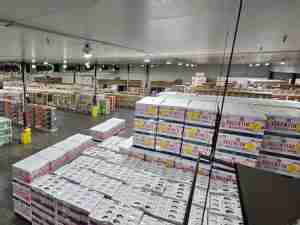As the predominant economic power in Asia with a huge export base, China generates almost all of the attention from the international transportation industry. Shipping lines are ordering huge, 10,000 teu capacity containerships primarily for the China trade. Airlines are calling on Boeing to deliver more of its updated 747 freighters to accommodate the explosively growing volume of air exports from China.
In this almost obsessive attention paid to the enormous strength of China, other, smaller nations of Asia are ignored. Yet, many of them quietly and efficiently are churning out a growing number of products for world business and industry. Malaysia is a matchless example of an often overlooked center of export activity. A British colony until after World War II, and a nation primarily once best known for its rubber plantations and tin mines, Malaysia today is a mini economic powerhouse. The nation produces an increasing number and variety of advanced technological products, in addition to more traditional goods for the fashion and apparel trades.
A few US freight forwarders realized years ago the potential for sustained growth in Malaysia, fueled by its then nascent export industries. One of the logistics pioneers was Target Logistic Services, a mid-sized freight forwarder with headquarters in Carson, CA. It began operations in Malaysia in 1991 with a small office located in that nation's second city, Penang. Today, Target Logistic Services is one of the leading logistics providers serving Malaysian export industries. The company's original, single small office in Penang has expanded to facilities in the nation's capital, Kuala Lampur; the important commercial city of Johor and a much larger facility in Penang. Growth for Target (which involves Target Air Freight, Target Roda and Target Warehousing) has been a consistent 20% per year.
Target handles both air and ocean freight with the air freight being the predominant type of transport. Air accounts for 90% of shipments with ocean amounting to about 10%. The government of Malaysia, realizing the crucial value of exports to the country's economy, has spent billions of dollars transforming the road and rail network of that nation. Once, narrow, two lane roads were the norm, primarily connecting rubber plantations to breakbulk ocean facilities. Today, six lane highways from North to South bind the nation and connect to surrounding countries including expressway links to the key city of Singapore. Seaports either have been expanded and modernized, or constructed from scratch as the one serving the city of Johor.
Electronic parts and components lead the list of products moved by Target via air and ocean. These components include resistor, capacitors and circuits. They are used in a wide variety of products for business and consumer purposes including personal computers, flat TV screens, DVD players, I-pods, wi-fi equipment and bar code devices that are found in almost every retail store today.
"Growth in the manufacture of electronic products for export continues very strong," remarked H.S. Cheng, managing director of Target's Malaysian operation, speaking from his office in Penang. While the preponderance of consumer electronic items moves by sea, Target has devised a system for the extremely rapid delivery by air of "must get through" shipments to assure a just-in-time arrival of components to prevent assembly lines from being "frozen" and to operate without interruption.
Target's delivery of "hot" Symbol Technology components 10,000 miles through four nations in under three days symbolizes (no pun intended) the forwarder's world class, professional capabilities.
Symbol Technology is the world's largest maker of bar code devices. The company's manufacturing plants stretch from Malaysia to Mexico. To ensure smooth, uninterrupted running of its assembly lines, parts must be delivered on a fixed schedule of shipments. To attain this objective, Target was contracted to develop a weekly schedule of shipments







